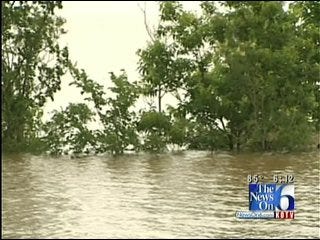State DEQ Issues Fish Consumption Advisories For Oklahoma Lakes
There are currently 16 Oklahoma lakes where some species of fish contain levels of mercury above what is considered safe for unlimited consumption. The consumption advisories are the result of three years of testing done by DEQ.<br /><br /><a href="http://www.deq.state.ok.us/fish/" target="_blank">DEQ Fish Consumption Advisory</a>Wednesday, July 7th 2010, 7:52 am
NewsOn6.com
OKLAHOMA CITY, OK -- If you like to eat fish from Oklahoma lakes and rivers, then you will want to pay close attention to a government report released Wednesday morning in Oklahoma City by the Oklahoma Department of Environmental Quality.
While the Oklahoma Department of Environmental Quality recognizes that fish is an important part of a healthy diet, the agency is issuing fish consumption advisories for mercury on some lakes. There are currently 16 Oklahoma lakes where some species of fish contain levels of mercury above what is considered safe for unlimited consumption. The lakes in Oklahoma with fish consumption advisories pertaining to the amount of mercury in the fish are:
- Atoka Lake
- Boomer Lake
- Broken Bow Reservoir
- Coalgate City Lake
- Draper Lake
- Elmer Thomas Lake
- Hugo Lake
- Kaw Reservoir
- Lake Heyburn
- McAlester City Lake
- McGee Creek Reservoir
- Pine Creek Reservoir
- Quanah Parker Lake
- Rush Lake
- Sardis Lake
- Wister Lake
Each of the above listed lakes has recommendations specific to that lake. For detailed information on the advisories and testing, please visit the DEQ fish consumption online.
The consumption advisories are the result of three years of testing done by DEQ with the cooperation of the Oklahoma Department of Wildlife Conservation. Many of Oklahoma's lakes have been tested to determine mercury levels. Only the 16 lakes listed above have specific advisories for mercury. For lakes that do not have specific advisories and lakes that have not been tested, DEQ encourages following the general guidance for fish consumption.
DEQ's general guidance recommends that the sensitive population (women of child bearing age and children up to the age of 15) should eat no more than one meal per week of predator fish, which includes largemouth, smallmouth, spotted, white, striped, or hybrid bass, walleye, saugeye and flathead catfish. In an effort to reduce exposure to mercury, everyone should eat smaller fish and eat a variety of fish.
DEQ recognizes the importance of the sport of fishing in Oklahoma. Fish provide many benefits that are essential for a healthy diet. Some fish do pose a higher risk for mercury contamination; therefore, DEQ encourages people to be mindful of the amount of fish they eat. DEQ actively promotes fishing and urges Oklahomans to enjoy the sport while following the suggested guidelines for fish consumption.
The levels of mercury in a lake do not affect the lake's safety as a source of drinking water or for lake recreation, such as swimming and boating.
DEQ will continue to test lakes throughout Oklahoma. Updates, as well as additional advisories, will be posted online as soon as the data is available.
A series of public meetings to address mercury in fish will be held starting July 13. More information on these meetings will be made available in the coming days.
Detailed information on the lake specific fish consumption advisory can be found on the DEQ website.
More Like This
April 15th, 2024
April 12th, 2024
March 14th, 2024
Top Headlines
April 19th, 2024
April 19th, 2024
April 19th, 2024











